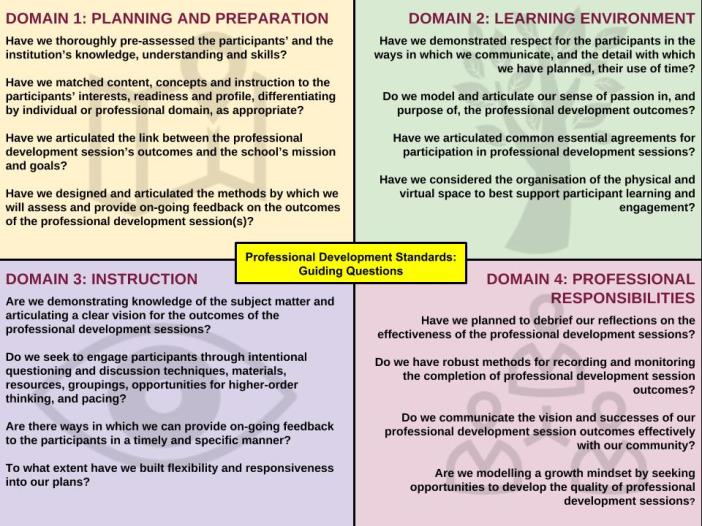Planning instruction for twenty or thirty learners in one room, for one hour, on one day, is a challenge. And, when we talk about planning instruction for in-service days or professional development sessions in which schools invest considerable time and money, we might be talking about hundreds of participants, in various venues, from distinctly heterogeneous teaching backgrounds and many hours of instruction. It’s a significant challenge. However, as I have written about here, it’s a challenge that we must overcome.
Many of my thoughts about school leadership revolve around applying the same practices that make classroom instruction effective. Imagine it as a series of Russian Dolls – the practices at the classroom teacher-learner level a nested microcosm of the interactions at the professional teacher-teacher level. At my school, we have adapted Charlotte Danielson’s teacher evaluation rubric as part of our teacher appraisal process. However, what if something similar were created for professional development sessions or in-service days?

The purpose of the adaptation would be as follows:
- As a planning checklist for organising professional development sessions.
- As an in-depth reflection tool to rigorously assess the quality of any professional development session and for facilitators to adjust their practices accordingly.
- To articulate a shared understanding of the components of high quality professional development sessions.
I’d remove the evaluative aspect of a rubric, replacing it with a series of standards and guiding questions to encourage professional growth. Though there are a variety of schools of thought on the effectiveness of coaching versus supervision models for driving positive change, assuming you have the people in place willing to improve, it’s the feedback, not the ranking of progress, that will drive improvement. Now, I’m not saying you couldn’t construct an evaluative rubric, it’s just that a simpler, more professionally respectful starting point is to use standards as a supportive coaching tool, not an evaluative one.
And, if you followed my thinking, you might be left with something like this.
I wonder what insights are revealed by reflecting on the last professional development you facilitated ,or participated in, by examining it through this new lens?
